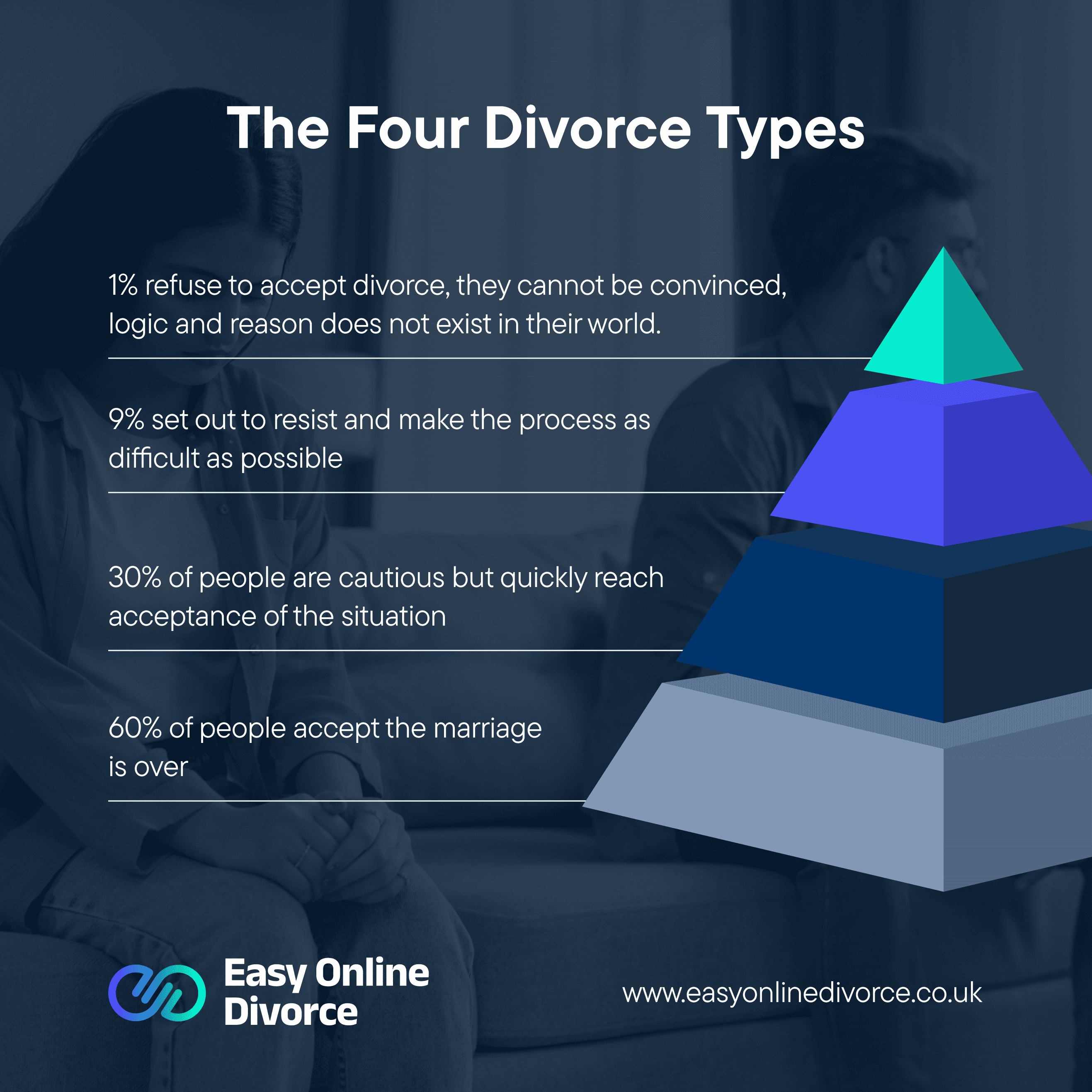If you’re planning on getting a divorce in the UK, it’s a good idea to familiarise yourself with the divorce process before you make any formal arrangements or seek legal advice.
Knowing what to expect can help you avoid unnecessary costs, prepare you for any delays that might occur during the proceedings, and simplify the process for both you and your former partner.
In this guide, we’re going to walk you through the current divorce process in the UK: how to get divorced, how long it takes, how much a divorce costs, and what hurdles you can expect to encounter along the way.
The Three Stages of the Divorce Process in the UK

In April 2022, divorce law in the UK changed, and no-fault divorce was introduced across the board. There are now three steps in the divorce process that all couples must take in order to complete and finalise their divorce (or dissolution in the case of a civil partnership):
Application
To begin divorce proceedings in the UK, you must submit a divorce application (also known as a divorce petition) to your partner. Your partner will have two weeks to send back an “acknowledgement of service” form confirming that they’ve received your divorce petition.
Previously, partners had the option of contesting a divorce petition. However, the new divorce laws put into place in April 2022 mean that a divorce can only be contested in extremely rare circumstances.
With the introduction of no-fault divorce in the UK, “irretrievable breakdown” is also now the only possible reason that you can cite for wishing to end your marriage. Previously, divorce petitioners would be obliged to give a motivating reason for carrying out their divorce (such as irrefutable evidence of adultery or prolonged absence).
While the new divorce laws make the divorce process longer, they also make it much easier to get out of an unhappy marriage without the approval of your spouse.
Reflection period
Once the petitioned partner has sent their acknowledgement of services, both parties will be obliged to enter a mandatory “reflection period” of 20 weeks.
This reflection period allows divorcing couples the time to consider and reconsider their options; some might opt for marriage counselling, while couples who are set on their decision might use the time to organise their post-divorce finances and childcare arrangements.
Conditional order (Decree nisi)
Once the reflection period of 20 weeks is over, divorcing couples will be able to apply for a conditional order (previously known as a decree nisi). A conditional order is a legal document that entitles you to proceed with your divorce and states that there is no reason why your divorce cannot go ahead and be approved. It can take up to five weeks for your conditional order to be approved by the courts.
Finalise your divorce (Final Order / Decree absolute)
Once your conditional order has been approved, you’ll be able to apply for a final order (formerly known as a decree absolute). This document finalises your divorce and renders you and your partner formally divorced in the eyes of the law. You’ll need to wait six additional weeks before you can apply for a final order.
Before applying for your final order, you’ll want to make sure financial settlements have been agreed to and are legally binding (via a financial order).
How Long Does the Divorce Process Take?
Since the introduction of no-fault divorce and the implementation of the Divorce, Dissolution and Separation Act in April 2022, a divorce in the UK will now take a minimum of seven months to conclude and finalise.
Previously, a divorce in the UK could be finalised much quicker: there was no mandatory 20 week reflection period, and couples could apply for a clean break consent order and be divorced in around 2-3 months.
Now, the mandatory reflection period has prolonged the process. Aside from the 20-week reflection period, you can also expect the following delays:
- 2 weeks to serve your former partner the divorce petition
- 2 weeks for your partner to return their Acknowledgement of Service form
- 5 weeks before the court grants the Conditional Order
- 6 weeks before applying for a Final Order
- 48 hours until the court grants the Final Order
However, the length of your divorce process will also depend on a number of other factors:
Type of divorce

Your spouse’s attitude to your divorce will be a big contributing factor to how long your divorce will take. The good news is that the no-fault divorce law prevents spouses from disputing and defending against divorce, so 99% of separating couples will be able to avoid the courts. However, when dealing with a resister, you may need to use a bailiff to serve the divorce papers on them.
The divorce process for the 1% who refuse to see reason will take longer (and cost more) because mediators, solicitors and the courts may need to be involved.
Obtaining a divorce online saves time when it comes to mediation, lawyers’ appointments, and time spent having to attend court. So couples who want a fast divorce will typically opt for online divorce services, as this is the quickest way to obtain a divorce in the UK.
If you take the traditional route and hire family law solicitors with the intention of going to court, the divorce process will take much longer (and will also be more costly).
Couples who want a fast divorce will typically opt for online divorce services, as this is the quickest way to obtain a divorce in the UK.
Obtaining a divorce online saves time when it comes to mediation, lawyers’ appointments, and time spent having to attend court.
Financial settlement
Being able to quickly reach a financial agreement will also prevent a lengthy and long divorce. Many divorcing couples might dispute over the division of their assets, and end up hiring divorce lawyers to help them get the best settlement. This can prolong the divorce process for months and even years at a time.
Child arrangements
Your post-spousal childcare arrangements will be one of the most important things you’ll be required to organise with your ex-partner. It can also be a lengthy process; if there are disputes or conflicts over childcare agreements, this can make your divorce process take much longer.
For a speedier divorce, it’s a good idea to organise and finalise these important arrangements during the reflection period.
Joint or sole applicant
The new laws introduced in April 2022 now allow couples to submit joint applications for divorce. A joint application means that you don’t “serve” your partner’s divorce papers, and instead, you apply together to start divorce proceedings. Applying jointly can cut the length of your divorce process by 2-3 weeks.
Correct information
In order for your divorce to move as fast as possible, you’ll need to ensure that all the information provided in your divorce application is correct. If there is missing or incorrect information on any of your divorce papers, you can expect weeks – and even months – of delays.
How Much Does a Divorce Cost in the UK?
The average cost of a divorce in the UK is £14,561. These costs can be typically broken down as follows:
Legal fees
If you hire family solicitors to handle your divorce, both parties can expect to pay thousands of pounds in legal fees. How much you pay in legal fees will depend on the complexity of your divorce; for example, if you choose to organise your childcare arrangements and your marital finances through your respective lawyers, expect a hefty bill at the end.
Lawyers charge anywhere from £200-£500 per hour billed, although some lawyers also offer fixed-price services. Fixed price services are mostly reserved for managing simple divorce documents (such as helping you write your divorce petition or drawing up an already-established financial settlement).
However, hiring lawyers before you’ve established agreements on your post-spousal life can cost thousands.
Court fees
There are a number of various court fees that you’ll be obliged to pay if your divorce procedure goes to court. In England and Wales, you’ll typically be expected to contribute a fee of £593 to cover the administrative costs of your divorce and your divorce application.
You might also face additional court fees, for example, if you cannot reach a financial settlement or childcare agreement with your former spouse. You may also be obliged to pay the following fees where necessary:
- £593 court fee paid by the divorce applicant (previously known as the petitioner)
- £275 to apply for a Financial Order (by means other than consent)
- £58 to apply for a Financial Order (with consent)
How can I reduce divorce costs?
There are three main ways you can reduce the cost of your divorce: either by claiming government assistance, hiring a mediator, or opting for divorce online.
Get government help
If you earn less than £1,170 before tax as a single person or £1,345 with a partner, you may not be required to pay the £593 divorce fee.
You may also be eligible for help with fees if you’re on one or more benefits, including Job Seeker’s Allowance, Universal Credit, Income Support, and Pension Credit. In order to qualify for government help, your savings must not exceed £3,000 (for those under 61), and must not exceed £16,000 (for those over 61).
Hire a mediator
Many couples use the 20-week reflection period to hire a mediator and organise their post-spousal life in a calm, controlled environment. With a mediator, you can sit down and organise your finances, child agreements, and any other settlements that might take time to agree on.
A mediator is much cheaper than hiring solicitors, although the mediator method might not be suitable for all couples; if your divorce is highly acrimonious, or if domestic abuse occurred throughout the marriage, a mediator might be unable to take on your case.
Opt for divorce online
One of the easiest ways to get your divorce finalised as soon as possible is by choosing to carry out your divorce online. While there’s no such thing as a free divorce, an online divorce service will keep your costs to an absolute minimum, replacing the need for solicitors, mediators, and court appearances. You won’t need to go anywhere in person; all you need to do is upload the right documents and the divorce company will take care of the rest for you.

Key Takeaways
- With the introduction of the new divorce law (known as the Divorce, Dissolution and Separation Act), getting a divorce in the UK is now a much simpler – albeit longer – process.
- The average divorce in the UK costs over £14,000 – unaffordable for most, and especially unaffordable for newly separated individuals. Before you seek legal advice, it’s a good idea to sit down with your partner and discuss important issues relating to childcare and finances.
- The best way to avoid high legal fees and court costs is by opting for online divorce – not only will you not be obliged to turn up at court, but everything can be carried out from the comfort of your own home.
- The divorce process for a civil partnership is mostly the same for a marriage; instead of obtaining a decree absolute, those terminating a civil partnership will have their union “dissolved”.
- Low-income individuals are entitled to government help in waiving the official court divorce fee, but make sure to check the details and income thresholds before applying for help.
- The law has now modernised official divorce terminology from its previous Latin: a decree absolute is now referred to as a final order, and a decree nisi is now referred to as a conditional order.
